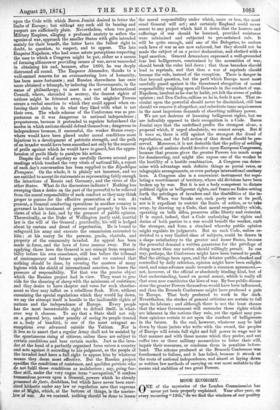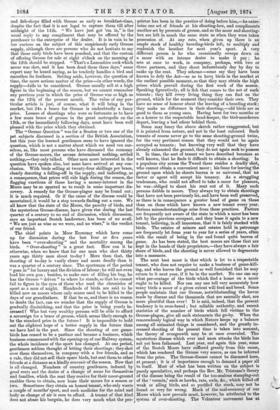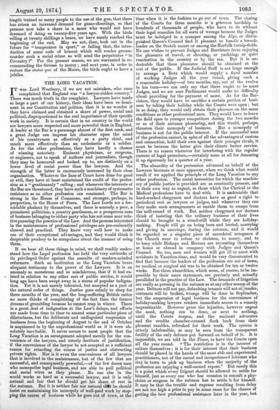MOOR ECONOMY.
ONE of the mysteries of the London Commissariat has never yet been properly explained. Year after year, on every recurring "12th," do we find the windows of our poultry and fish-shops filled with Grouse as early as breakfast-time, despite the fact that it is not legal to capture them till after midnight of the 11th. "We have just got 'em in," is the usual reply to any compliment that may be offered by the purchaser to the enterprise of the dealer. It is in vain to be too curious on the subject of this suspiciously early Grouse supply, although there are persons who do not hesitate to say that these early birds have been poached, and that the custom of offering Grouse for sale at eight o'clock on the morning of the 12th should be stopped. "That's a Lancashire cock which never was shot, and it has been dead theee three days," some expert may be heard saying, as he tenderly handles a bird and smoothes its feathers. Setting aside, however, the question of time, the more serious matter of the price—in other words, the supply—falls to be considered. Grouse usually sell at a high figure in the beginning of the season, but we cannot remember any previous year in which the price of Grouse was so high as on the 12th of the present month. The value of any par- ticular article is just, of course, what it will bring in the market, but 24s. a brace for Grouse is undoubtedly a fancy price. Lessees of shootings who were so fortunate as to have a few score brace of grouse in the great metropolis on the 12th, or the immediately following days, must have been well pleased with the price which they obtained. The "Grouse Question" was for a Session or two one of the pet subjects discussed in a section of the British Association, but this year the learned gentlemen seem to have ignored the question, which is not a matter about which we need vex our- selves, as, like most persons who have discussed the economy of the Grouse-moors, the sevens determined nothing, settled nothing,—they only talked. Other men more interested in the question have spoken also, but none have arrived at any con- clusion. With birds selling at twenty-four shillings per brace, clearly denoting a falling-off in the supply, and indicating, as a consequence, that prices will rale high during the season, the flagging exertions of those having a money-interest in the Moors may be so spurred as to result in some important dis- covery. A remedy for the Grouse-plague may be found out ; it is much required. Or if the cause of the disease could be ascertained, it would be a step towards finding out a cure. We all know that the state of the Moors, the paucity of birds, and the mysterious Grouse-disease, have given rise during the last quarter of a century to no end of discussion, which discussion, says an important Scotch landowner, has been of no avail. "We are just as wise as we were, and no wiser," is the verdict of our friend.
• The chief points in Moor Economy which have come up for discussion during the last four or five years have been " over-shooting " and the mortality among the birds. " Over-shooting " is a great fact. How can it be otherwise, when we know that for one man who shot thirty years ago thirty men shoot to-day ? More than that, the shooting of to-day is vastly closer and more deadly than it was a quarter of a century since. The sportsman of the period "goes in " for luxury and the division of labour; he will not even load his own gun ; besides, to make sure of filling his bag, he has the Grouse " driven " to where he stands, so that he cannot fail to figure in the eyes of those who read the chronicles of sport as a man of might. Hundreds of birds are said to be killed now on moors where only scores used to be killed in the days of our grandfathers. If that be so, and there is no reason to doubt the fact, can we wonder that the supply of Grouse is gradually dineiniehing, and that the price is being yearly in- creased? Who but very wealthy persons will be able to afford a sovereign for a brace of grouse, which seems likely enough to be the standard price in the future? It is impossible to hold out the slightest hope of a better supply in the future than we have had in the past. Since the shooting of our game- birds has ceased to be a pastime and became a business, which business commenced with the opening-up of our Railway system, the whole incidence of the sport has changed. At one period, gentlemen seldom thought of letting their shootings; they shot over them themselves, in company with a few friends, and as a rule, they did not sell their spare birds, but sent them to other friends at a distance as a kindly souvenir of the season. Now that is all changed. Numbers of country. gentlemen, induced by good rents and the desire of a change of scene for themselves and families, which the rent they receive for their moor-ground enables them to obtain, now lease their moors for a season or two. Sometimes they obtain an honest tenant, who only wants a couple of months' sport, and such medicine for the mind and body as change of air is sure to afford. A tenant of that kind does not abuse his bargain, he does very much what the pro- prietor has been in the practice of doing before him,—he enter- tains one set of friends at his shooting-box, and compliments another set by presents of grouse, and so the moor and shooting- box are left in much the same state as when they were taken possession of. At any rate, when given up there is an ample stock of healthy breeding-birds left, to multiply and replenish the heather for next year's sport. A very different person is he who occasionally sweeps down on a moor with an intense desire to make it pay ; he sets at once to work, in company, perhaps, with two or three partners, and they shoot industriously day by day to make up the rent. They scheme—some say they have been known to defy the Act—so as to have birds in the market at the earliest possible moment, so that they may obtain the high prices which prevail during the first week of the season. Speaking figuratively, all is fish that comes to the net of such tenants ; they kill every living thing they can find on the ground, which for the moment they consider their own. They have no sense of honour about the leaving of a breeding stock; they make no diffeience in their shooting,—old birds are as good to them as young ones. Having been for two months or so a horror to the respectable head-keeper, the bird-murderers depart, leaving a bad odour behind them.
Some may fancy the above sketch rather exaggerated, but it is painted from nature, and not in the least coloured. Such tenants of course never go to the same shooting-ground twice, for the very pertinent reason that they would not be again accepted as tenants ; but knowing very well that they have already exhausted the ground, they do not again seek to possess it. In time, the sort of tenant we have described becomes so well known, that he finds it difficult to obtain a shooting. In a populous city across the Tweed there resides a deadly shot, who cannot obtain a convenient moor ; his fame for leaving the ground upon which he shoots barren is so universal, that no factor or agent will accept his tenancy. As a struggling tradesman, who could not afford to take a moor for pleasure, he was obliged to shoot his rent out of it. Many such persons dabble in moors. They always try to obtain shootings that have not been previously let, and have been well preserved, as there is in consequence a greater head of game on these than on those which have known a new tenant every year. Serious misunderstandings arise from these practices. Factors are frequently not aware of the state in which a moor has been left by the previous occupant, and they lease it again to a new tenant, believing, in all innocence, that it is fairly stocked with birds. The estates of minors and estates held in patronage are frequently let from year to year for a series of years, often with the result of being in the end found quite barren of game. As has been stated, the best moors are those that are kept in the hands of their proprietors,—they have always a fair share of birds, and the shooting is never allowed to degenerate into a massacre.
The next best moor is that which is let to a respectable tenant, who does not require to make a business of game-kill- ing, and who leaves the ground so well furnished that he may return to it next year, if it be in the market. No one can say what per-centage of the birds which find a home on a moor ought to be killed. Nor can any one tell very accurately how many birds a moor of a given extent will feed and breed. Some people maintain that our Grouse, notwithstanding the havoc made by disease and the thousands that are annually shot, are more plentiful than ever ! It is said, indeed, that the present tendency is to over-breed ; but reliable authority, and recent statistics of the number of birds which fell victims to the Grouse-plague, give all such statements the go-by. When the remorselessly logical way in which Nature keeps up a balance among all animated things is considered, and the greatly in- creased shooting of the present time is taken into account, the theory of overgrowth may be at once overruled. The mysterious disease which ever and anon attacks the birds has not yet been fathomed. Last year, and again this year, some of the Scotch Moors have suffered greatly from this cause, which has rendered the Grouse very scarce, as can be inferred from the price. The Grouse-disease cannot be discussed here, at present ; it is of importance enough to demand a paper all to itself. Most of what has been written on the subject is purely speculative, and perhaps the Rev. Mr. Tristram's theory of the disease being the result of the too-zealous stamping-out of the vermin,' such as hawks, rats, owls, &c., which killed off weak or ailing birds, and so purified the stock, may not be found so very far wrong. Much of the mal-economy of our Moors which now prevails must, however, be attributed to the system of over-shooting. The Volunteer movement has at length trained so many people to the use of the gun, that there has arisen an increased demand for game-shootings, so that persons now take a share in a moor who would not have dreamed of doing so twenty-five years ago. With the birds selling at twenty shillings a brace, we have surely reached the beginning of the end. May we not, then, look out in the future for "temperance in sport," or failing that, the intro- duction of some code of honour which will render grouse- murder such a social crime as will send the perpetrator "to Coventry I" For the present season, we are warranted in re- commending the Grouse to mercy ; and next year, in order to restore the status quo of the Moors, the birds ought to have a jubilee.
































 Previous page
Previous page